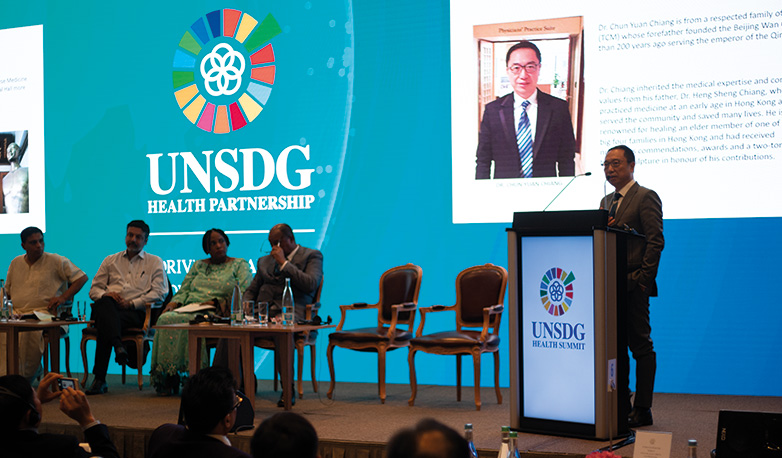IHDpay Group: Take a Few Tech Advances and Call Me in the Morning
2019年7月8日
Tech advances are rippling across industries worldwide, challenging traditional systems in the quest for enhanced efficiency and user experience.

Switzerland: Dr Chiang Chun Yuan, Founder of IHDpay Group, speaking at a UNSDG Health Partnership Summit in Geneva.
Healthcare is one sector on the cusp of radical technological transformation. Chiang Chun Yuan, a doctor with more than three decades of clinical experience, founded the IHDpay Group to create a bridge between Chinese patients, hospitals and pharmacies.
Doctors in major Chinese hospitals treat as many as 20,000 patients per day. Before the launch of IHDpay, many suffered wait times of up to three hours — just to make an appointment. A flourishing enterprise of line-sitters, or “skippers”, developed as a cottage industry for those unable to endure the interminable waits.
Those days are over. IHDpay has streamlined processes across the healthcare system from bookings to prescriptions and payments.
“We focused partly on how the whole payment journey in the whole medical and pharmaceutical ecosystem can be served better,” Yuan told CFI.co. “Ultimately, no matter what you are dealing with — drugs or tests, etc — you’re going to involve payment.”
The platform provides a hardware-software solution with an incorporated payment system. One of the main focuses of the company is to enable healthcare financers — whether government medical plans or commercial health insurance companies — to streamline services.
Typical internet medical companies are dealing mainly with a concierge-type of service, Yuan says, ranging from appointment bookings to digital storage of medical records or even telemedicine. While he views these developments as essential, he hopes to “provide something a bit (closer) to AI”.

Dr Chiang Chun Yuan and Tor Svensson in Geneva
The core technology underpinning IHDpay operations is its Payment Processing Authentication System (PPAS). Developed in-house, it aims to meet the challenges of payment authentication in a digital world. PPAS is protected with facial recognition algorithms and biometric technologies, enabling authentication of individuals and quantitative analyses of trends. PPAS also forms the backbone of IHDpay’s Cloud-based Hospital and Insurance Platform, which supports the country’s growing demand for holistic healthcare management.
Know Your Customer procedures are a crucial component of healthy business practices, enabling companies to vet potential — and current — clients for regulatory compliance and risk assessment. With the advent of mobile technology and improved data-processing capabilities, e-commerce fraud and money-laundering threats are increasingly common.
The extra level of security provided by PPAS, Yuan explained, translates to better service and quality for patients. “When the patient collects the medicine at the drug store, they have to do a biometric reconciliation. Either facial or voiceprint, so there will not be a misplacement of medicine to another [person] because only you — biometrically fully identified and validated — will collect the particular pack of medicine.”
The IDHpay platform is accessible via a mobile app, powered by AI and machine learning, to provide customers with real-time data for prescription procurement and payment. Patients can schedule medicine for pickup or home delivery — with a unique QR code for identification and immutable blockchain tracking.
Booking a doctor’s appointment is a painless process through IHDpay’s 360° Total Information Medical Service, or 360° TIMS. Around 15 million active users benefit from the service, and Yuan anticipates reaching 50 million by the end of 2020.
Originally from Hong Kong, IHDpay predominantly serves the greater Bay Area in southern China, but the company’s open platform — compatible with all mobile operating systems — has pushed the company to roll out a version for Japanese and English-speaking markets. Yuan has sights set on African markets for expansion.
“It’s basically like an OS operating system that serves some components of the medical and pharmaceutical ecosystem”, Yuan said. That includes the doctors and patients in hospitals, the pharmaceutical industry from laboratories to manufacturers to retailers, and the healthcare financers, whether commercial or governmental.
“With this kind of control, systemically making use of AI, big data and QR code repayment, you really are very much eliminating any human factor. Healthcare is not the market, it’s the world.”
Yuan is betting on AI to take over the industry’s more routine tasks and to assist health providers with more complex diagnoses or procedures. “I think in time the doctor-patient relationship will also be improved, because then the doctor has more time for every patient and the simple things just go back to the system.”
Yuan, who was born to a family of medical practitioners, grew up with an appreciation for the complementary powers of Western medicine and traditional Chinese medicine. After dedicating over 30 years to his clinical practice, the doctor decided to explore the burgeoning digital health market. As the company continues to expand, through its geographic presence and open collaborative platform, Yuan hopes to ultimately “help to bridge the international experiences with the local wisdom”.
“At this moment, we focus on improving efficiency, safety and transparency,” he says.
He isn’t worried about the competition — the two giants of regional digital and mobile payment markets, Ali Pay and Retail Pay — because IHDpay has created a special niche. The IHDpay leadership team boasts impressive expertise and healthcare networking contacts, enabling IHD Pay to deliver better end-solutions for all stakeholders in the healthcare ecosystem.
Interview by CFI.co Chairman Tor Svensson.
Excerpts of interview and speech from UNSDG Health Partnership Summit 2019 in Geneva.
